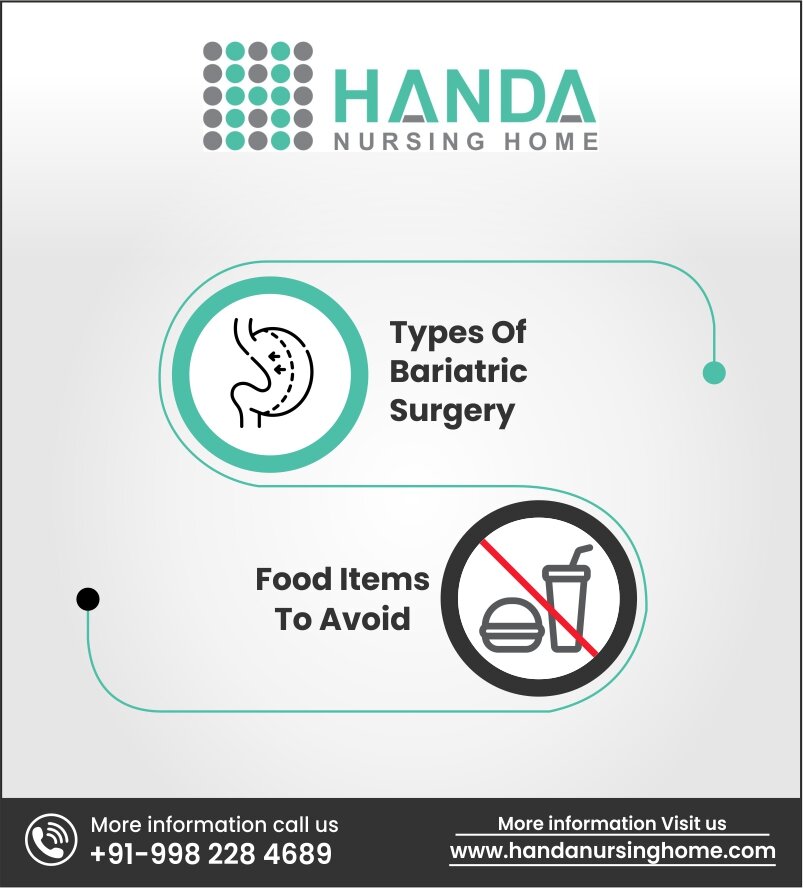Obesity is a common and chronic condition that can be life-threatening as well and thus requires long-term management. There are many medications and surgeries to help attain weight loss, and among the best weight loss surgeries is bariatric surgery. It is a surgical method that enables you to lose weight by altering your appetite and digestive system. This surgery option is generally only for adults and is recommended for teens if they are extremely obese and have weight-related medical issues. Bariatric surgery is not just associated with losing weight; it helps an individual to live longer and better quality of life by treating and preventing obesity-related conditions, including diabetes, heart disease, high BP, diabetes, and arthritis. If you are thinking of bariatric surgery in Delhi, visit the best bariatric surgeon in Delhi to first discuss all your concerns. Handa Nursing Home is one of the best clinics in Delhi, and it has a great team of cosmetic surgeons.
Types Of Bariatric Surgery
The main aim of bariatric surgery is to promote weight loss. It is performed to treat and prevent many diseases associated with obesity. The surgery restricts the amount of food that an individual can hold or absorb. Bariatric surgery is of many types and is done with minor cuts by using minimally invasive techniques. Some of the popular weight loss surgery procedures are :
- Laparoscopic Roux-En-Y Gastric Bypass:
Also known as gastric bypass, it is the most popular weight loss surgery option designed to reduce the size of your stomach. This reduction means your body will absorb fewer calories and nutrients, which will lead to hormonal changes that will influence your hunger signals. This type of Bariatric surgery will result in the most significant weight loss as compared to other types. However, it is also considered the most complex of all kinds of weight loss surgeries. This surgery will ultimately reduce the upper stomach size to a small pouch, and it will be the size of an egg. The surgeon will staple the upper section, which reduces the amount of food you can eat. The surgeon will attach the pouch directly with the small intestine which forms a Y shape. The food that a person will consume then bypasses the rest of the stomach, along with the upper part of the small intestine which reduces the amount of fat and calorie intake with vitamins and minerals intake as well. You might need a gastric bypass surgery for weight loss if you want to treat severe obesity. The doctor will advise this type of people
- Who tried many weight-loss methods like diet and exercise but had no success.
- If a person is obese with a body mass index above 40.
- If you have a BMI between 35 and 40 along with a health condition like high BP, heart disease, sleep apnea, etc.
This type of weight loss therapy can help you lose about 100 pounds and improve many health conditions, like diabetes. It can also help to prevent heartburn and reflux and lower certain health conditions. There are advantages and disadvantages of Laparoscopic Roux-En-Y Gastric Bypass:
- It is a reliable and long-lasting solution for weight loss
- It is effective for the remission of obesity-related conditions
- It is a standardized and more refined technique.
- Technically, it is more complex as compared to other weight loss surgeries.
- There is a risk of minor bowel complications in it.
- Also, there is a risk of developing ulcers.
- Laparoscopic Mini Gastric Bypass:
It is the most advanced and newer version of traditional gastric bypass. Mini gastric bypass surgery helps treat obesity by reducing stomach size to facilitate early satiety. This reduction in stomach size limits food intake and appetite. It is considered the less complicated procedure and has the same or even much better long-term weight loss outcomes than the Gastric Sleeve and Roux-en-Y or Gastric Bypass. The Mini Gastric Bypass is newer and more invasive in comparison to Sleeve Surgery and is less invasive than the traditional Gastric Bypass.
During this type of weight loss surgery, the expert surgeon generates a slim tube-like pouch that can possess just one to two ounces of food at a time. The surgeon will link the small intestine to the new pouch, and this placement with the intestine absorbs fewer nutrients by the body, which leads to weight loss. Post-surgery and for your entire life, you need to prepare a proper routine, a healthy diet, and an exercise chart. There are many advantages and disadvantages of the mini gastric bypass surgery :
- It is a less invasive procedure.
- It limits the amount of food undigested and calories absorbed.
- It offers much more weight loss than sleeve methods.
- It offers intolerance to specific foods.
- Need lifelong multivitamins.
- Vitamin deficiency.

Food Items To Avoid:
It is crucial to avoid some food items on a post-bariatric surgery diet to get the proper amount of nutrition and to lose weight. Many people have a misconception that if they can eat solid food, they can have it all without any restrictions . Surgeons will advise you on a clear liquid diet for a week post surgery. After that, there are many food items that patients have to avoid.
Food with empty calories must be avoided. Bariatric surgery gives you an egg-sized stomach, which you have to fill with wise diet options. You must avoid foods that offer little or no nutritional value, like sweets, chips, popcorn, rice, pastries, etc.
- Alcohol has a high calorie content thus it should be avoided . These alcoholic beverages take up much space in the stomach and should be avoided as they lead to intoxication. Also, avoiding drinking beverages with food before or after a meal will help.
- Avoid dry foods, at least immediately after bariatric surgery. Consume cereal regularly , by softening by low-fat milk.
- Avoid bread, pasta, and rice due to their starchy nature. These can form a paste and also block the hole of the stomach pouch.
- Avoid eating hard-to-digest, fibrous vegetables, and also avoid Celery, corn, broccoli, cabbage, and asparagus, specifically during the early days after bariatric surgery.
- Avoid eating fatty foods, skip butter, sausage, bacon, whole milk, and hard cheeses, and choose lower-fat options.
- Avoid tough meat, such as steak, pork chops, hot dogs, and ham. Chewing is also essential when eating meat on a bariatric diet.
- In the initial weeks, spicy foods should be avoided as they may be difficult for your digestive system to process. It’s best to slowly come back to the above listed foods after bariatric surgery.
Bariatric surgery, when done at the best clinic in Delhi, like Handa Nursing Home, is a highly effective procedure to attain significant weight loss. Keep in mind that it is essential to follow a routine diet for long-lasting results. Bariatric surgery is a permanent weight reduction solution that needs special care post-weight loss surgery. As everybody has different requirements post weight loss surgery, it is best to consult the surgeon in Delhi regarding what foods and beverages to avoid to attain the best results.

